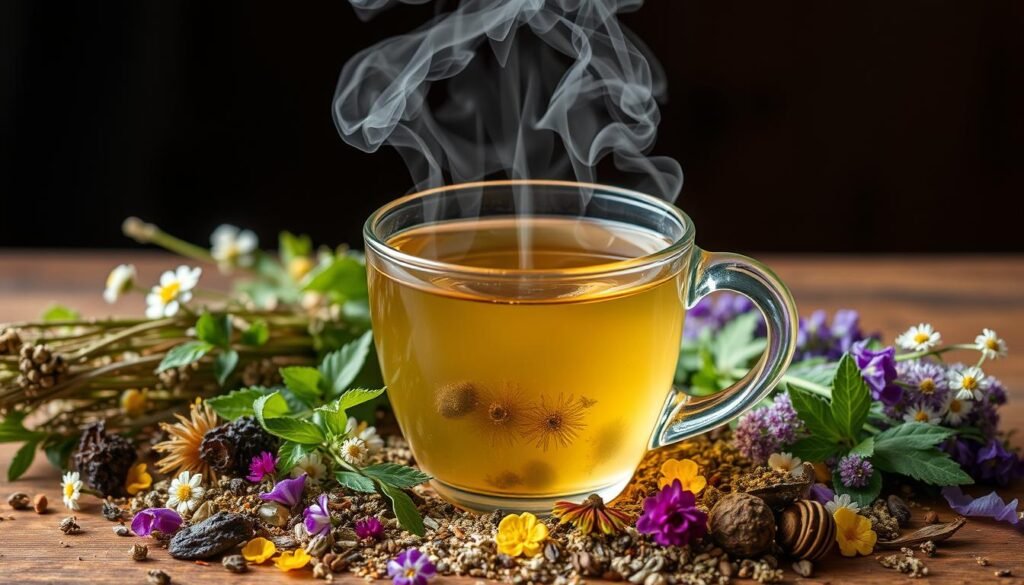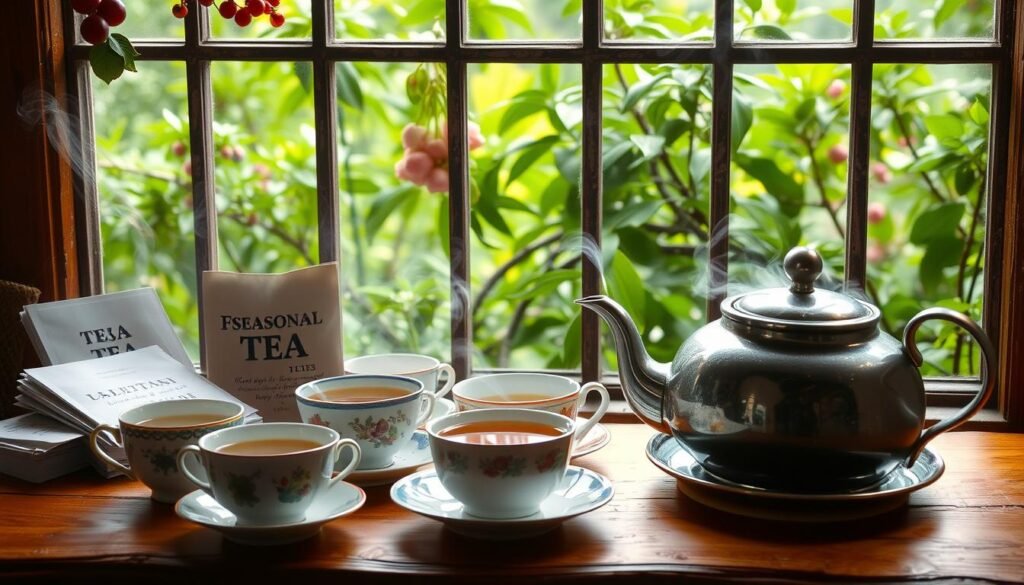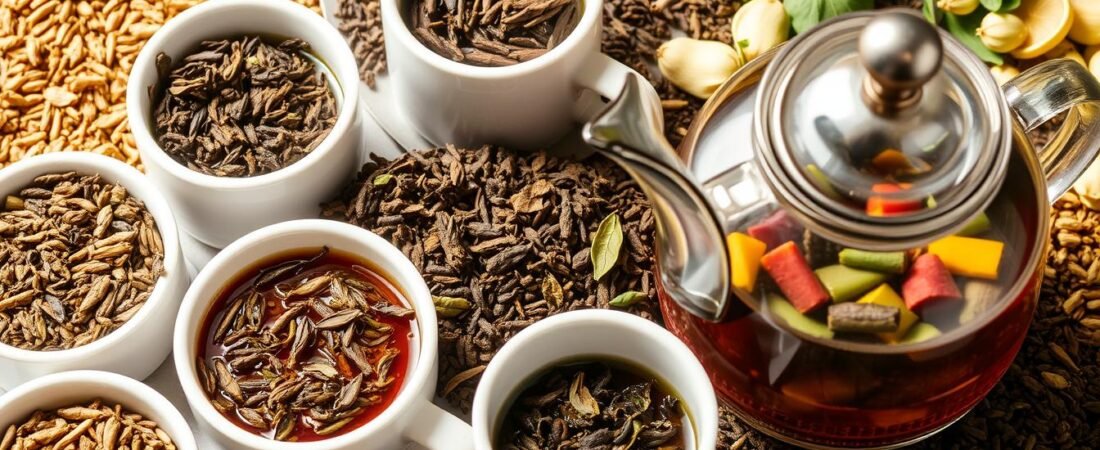Tea is a favorite drink worldwide, with a long history and many types. Each type offers health benefits, making tea a fascinating topic. From green tea to black tea, and herbal tea, each has its own special qualities1.
Green tea is known for its health benefits, with more antioxidants than other teas1. Black tea, on the other hand, is the most popular globally. It boosts alertness, has antioxidants, and may lower heart disease risk1.
Key Takeaways
- Tea is the most consumed beverage in the world after water, illustrating its global significance and appeal1.
- Green tea is considered one of the healthiest tea options, with more antioxidant properties than other types of tea1.
- Black tea accounts for approximately 75% of the total tea consumption worldwide, making it the most widely consumed type of tea2.
- Oolong tea, being partially oxidized, offers a unique flavor profile and shares health benefits with both green and black teas1.
- Herbal tea sales have surged by 40% in the past decade, indicating a rising trend toward caffeine-free and wellness-oriented options2.
- Tea benefits include reduced risk of heart disease, improved circulation, and lower blood pressure, among others132.
Understanding the Rich History of Tea Through the Ages
Tea has a long and interesting history that started in southern China45. The camellia sinensis plant, where all true teas come from, was found almost 5,000 years ago. Emperor Shen Nung discovered it in ancient China in 2737 BC4. Over time, tea spread all over the world, with different types emerging. Each type has its own health benefits, like antioxidant-rich teas5.
Tea’s journey took it to new places, like India, where the British introduced it to counter China’s tea dominance4. Now, people all over enjoy tea, with different areas focusing on specific types. For example, green tea, black tea, and white tea each offer unique health perks5.
- Green tea, the least processed, doesn’t go through oxidation4
- Black tea is made by exposing leaves to hot air, rolling, and drying in an oven4
- White tea, the rarest, is made from fine shoots picked at the start of the season4
These teas are good for you, boosting metabolism, immunity, and helping with weight loss. They’re popular for their health benefits5.
| Tea Type | Health Benefits |
|---|---|
| Green Tea | Higher metabolism, boosted immunity, and aiding weight loss4 |
| Black Tea | Reduced blood pressure, lower stroke risk, and lowered blood sugar levels4 |
| White Tea | Increased bone density, protection against Rheumatoid Arthritis, and improved heart function4 |
Common Types of Teas and Their Benefits
Tea is a low-calorie drink that helps with hydration, making it great for diets6. There are many types of tea, each with its own benefits. Green tea, black tea, and white tea come from the camellia sinensis plant but are processed differently. Green tea has 28 mg of caffeine per 8-ounce cup, while black tea has 47 mg6.
Herbal teas, however, are not from the camellia sinensis plant and have no caffeine. They offer health benefits like better sleep and help with depression in new moms7. Teas like chamomile and peppermint can also improve digestion and help with irritable bowel syndrome7.
| Tea Type | Caffeine Content | Health Benefits |
|---|---|---|
| Green Tea | 28 mg per 8-ounce cup | Antioxidant content, weight management properties6 |
| Black Tea | 47 mg per 8-ounce cup | Theaflavins and thearubigins for heart health6 |
| Herbal Tea | 0 mg | Improving sleep quality, alleviating depression7 |
The Power of Green Tea: Nature’s Health Elixir
Green tea is famous for its health perks, like helping with weight, improving focus, and boosting heart health8. It’s packed with antioxidants, making it great for better health and wellness. Green tea is picked and then quickly steamed or pan-fried to keep its antioxidants strong.
Green tea can lower the risk of brain problems by 64% in adults8. It also helps speed up metabolism, especially when you exercise8. Plus, it might protect against diseases like Alzheimer’s and Parkinson’s because of its antioxidants9.
The health perks of green tea are many, including:
- Weight management properties
- Mental clarity and focus benefits
- Heart health advantages
- Potential reduction in cancer risk
- Neuroprotective effects
Adding green tea to your daily life can greatly improve your health and wellness. It offers many benefits, like being rich in antioxidants and improving overall health10.
| Benefit | Description |
|---|---|
| Weight Management | Green tea may aid in weight loss by increasing metabolic rate and promoting fat oxidation10 |
| Mental Clarity and Focus | Green tea contains L-theanine, which can help reduce anxiety and stress9 |
| Heart Health | Green tea may help lower blood pressure and reduce the risk of heart disease8 |
Black Tea: The Bold and Beautiful Brew
Black tea is known for its strong flavor and dark color. It offers many health benefits of tea and is a favorite among tea types. It has about 30-60 mg of caffeine per cup, which is less than coffee.
Black tea can help improve heart health and lower disease risk. It’s made from two tea plant varieties: Camellia sinensis sinensis and Camellia sinensis assamica11. China and India produce most of the world’s black tea11.
Other countries like Sri Lanka, Nepal, Vietnam, and Kenya also produce black tea. They are increasing their market share11.
Here are some key facts about black tea:
- Black tea makes up over 70% of global tea consumption12.
- Organic black teas have 40 to 90 mg of caffeine per serving12.
- Darjeeling black tea is rich in antioxidants, fighting harmful free radicals in the body11.
To make black tea, use one teaspoon of tea leaves for six ounces of water. Heat the water to 212 degrees Fahrenheit11. Steep for 3-5 minutes to enjoy its caffeine11. Black tea is a tasty and healthy option for those exploring tea types and their health benefits.
Black tea is a tasty and healthy drink with many black tea benefits. It’s a favorite among tea lovers. Whether you want to boost your heart health or just enjoy a strong tea, black tea is a great choice11.
White Tea: The Delicate Defender of Health
White tea is known for its delicate taste and high antioxidant levels. It’s minimally processed, keeping its natural antioxidants. This makes it a top pick for those looking for antioxidant-rich teas. White tea’s antioxidants help fight free radicals and oxidative stress, thanks to its catechins, flavonoids, and polyphenols13.
White tea’s benefits include protecting cells and reducing disease risk. It also helps with aging, regulating blood sugar and improving insulin sensitivity13. Plus, it supports the immune system, with its polyphenols showing antioxidant and antiproliferative effects14.
Antioxidant Properties
White tea has more polyphenols than other teas, making it great for fighting cancer15. Studies show it can reduce tumor formation by 80%, from 30 to 6 tumors15. It also has less caffeine than other teas, which is good for those who can’t handle much caffeine15.
Anti-aging Benefits
Drinking white tea regularly can help with cell regeneration. This promotes skin health and may slow aging14. Its polyphenols also lower cholesterol and blood pressure, aiding in anti-aging15. White tea may even boost metabolism by 4-5%, burning about 70-100 extra calories daily13.
Herbal Teas: Beyond Traditional Varieties
Herbal teas come from leaves, flowers, and roots of plants. They offer unique tastes and herbal tea benefits. These teas are loved for their health benefits of tea and are a favorite among tea lovers16. Popular ones include chamomile, peppermint, hibiscus, rooibos, and ginger tea17.
Each tea type has its own special qualities. Chamomile tea helps you relax and sleep better17. Peppermint tea is great for your stomach, easing bloating and indigestion17. They also have antioxidants, which might help lower blood pressure and keep your heart healthy17.
Here are some key points to consider when exploring herbal teas:
- Herbal teas are caffeine-free, making them perfect for unwinding without jitters17.
- Choose organic and non-GMO herbal teas to avoid harmful chemicals17.
- Use hotter water and steep them longer to get the most flavor and benefits17.

Adding herbal teas to your daily routine can bring many health benefits of tea. You can enjoy the unique tastes of different tea types16. Whether you like chamomile for calmness or peppermint for your stomach, there’s a herbal tea for you17.
| Herbal Tea | Benefits |
|---|---|
| Chamomile | Calming effects, promotes better sleep |
| Peppermint | Digestive benefits, relieves symptoms of bloating and indigestion |
| Hibiscus | Rich in antioxidants, supports heart health |
Mastering the Art of Tea Preparation
To enjoy the many tea types and their health perks, learning how to prepare tea is key. It’s about using top-notch tea leaves, water, and tools to highlight each tea’s unique taste and health benefits18. The traditional Japanese tea ceremony, or “chanoyu,” shows the importance of ritual and formality in making tea19.
Water temperature and steeping time are vital when brewing tea. For instance, L-theanine extracts best at 175ºF (80ºC)18. Caffeine, on the other hand, infuses quickly at boiling water temperatures of 212ºF (100ºC)18. The standard ratio for Western brewing is 1g of tea leaves to 50ml of water, but it can change based on the tea type and personal taste18.
The right teaware can also make a big difference in the tea experience. In Japan, the traditional tea ceremony uses Chawan (tea bowls) and Chasen (tea whisks)19. Chinese tea culture often employs Gaiwan (small lidded bowls) and Yixing teapots19. By mastering tea preparation and trying different teas, you can fully enjoy tea’s health benefits and have a rewarding experience.
| Tea Type | Water Temperature | Steeping Time |
|---|---|---|
| Green Tea | 175ºF (80ºC) | 1-3 minutes |
| Black Tea | 212ºF (100ºC) | 3-5 minutes |
| Herbal Tea | 212ºF (100ºC) | 5-10 minutes |
By following these guidelines and trying out different teas and brewing methods, you can grow to love the art of tea preparation. You’ll also get to enjoy the many health benefits of tea20.
Seasonal Tea Drinking: Matching Teas to Weather and Wellness
Exploring teas means looking at seasonal drinking. It’s about picking teas that match the weather and our health needs for each season21. This way, we can enjoy the health perks of tea, like better digestion and stronger immunity, by choosing the right tea.
In winter, teas like ginger and peppermint can fight off sore throats and stomach problems21. Spring and summer are for lighter teas like green tea and herbal infusions. They help with weight loss and boost metabolism22.
Some favorite seasonal teas are:
- Ginger tea warms us up in autumn and winter21
- Peppermint tea cools us down in summer22
- Chamomile tea calms us in any season23
Adding seasonal tea drinking to our daily lives boosts our health and wellness21. Whether we like traditional teas or herbal ones, there’s a perfect tea for every season and event.

Conclusion: Embracing the Daily Tea Ritual for Better Health
Tea has been around for ages and is packed with health benefits. It boosts our mental clarity and helps with weight management. It also keeps our hearts healthy24.
Teas like chamomile and peppermint aid digestion and help us relax. Drinking tea regularly can lower inflammation and improve our focus25.
Tea isn’t just good for our bodies; it also brings people together. The Japanese tea ceremony teaches us to be present in the moment. In the U.S., new tea ceremonies are gaining popularity, with a 40% rise in tea blends and concentrates like Black Scottie Chai in the past year25.
So, why not make tea a part of your daily routine? With over25 1,500 types of tea worldwide, there’s a lot to explore. Tea can improve our health, help us connect with others, and increase mindfulness. Let’s toast to a healthier life, one cup of tea at a time!

